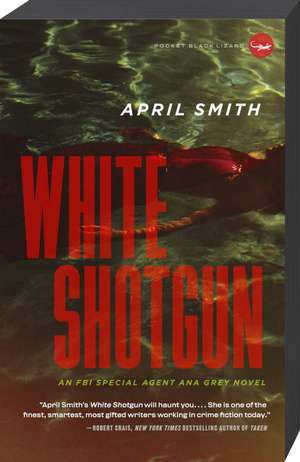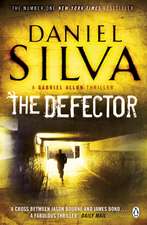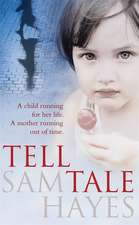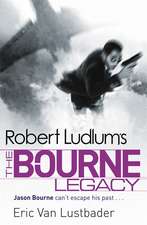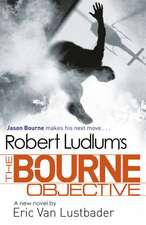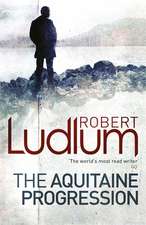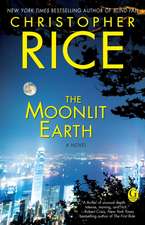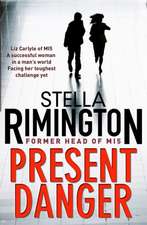White Shotgun: FBI Special Agent Ana Grey Novels
Autor April Smithen Limba Engleză Paperback – 30 iun 2012
MEMORANDUM [TRUSTED AGENTS ONLY]
TO: SAC Robert Galloway, Los Angeles Field Office
FROM: Special Agent Dennis Rizzio, FBI LEGAT, Rome
SUBJECT: Special Agent ANA GREY
LOCATION: Siena, Italy
TARGET: NICOLI NICOSA, head of successful coffee import business. Suspected mafia involvement.
CONTACT: CECILIA MARIA NICOSA, wife of Nicoli Nicosa. Popular socialite. Claims to be Special Agent Grey’s sister.
THE MISSION: Special Agent Grey to make close contact with Cecilia Maria Nicosa. Penetrate family. Investigate disappearance of mafia operative, LUCIA VINCENZA, Nicosa’s mistress. Gather intelligence on Nicosa’s possible ties to cocaine trafficking.
SPECIAL CIRCUMSTANCES: Special Agent Grey will arrive during Il Palio, a famous horse race and time of high tension in the city. Violent outbreaks among rival contradas (neighborhoods) are common.
WARNING: THE SOUTHERN MAFIAS HAVE BEEN MAKING STRONG INROADS IN THIS PART OF ITALY. MANY ENEMIES GO “WHITE SHOTGUN.” THEY DISAPPEAR.
UPDATE: Cecilia Maria Nicosa has been kidnapped and their sixteen year-old son, Giovanni, severely beaten. Nicoli Nicosa suspicious of FBI involvement. Special Agent Grey to exercise extreme caution.
Preț: 77.49 lei
Nou
Puncte Express: 116
Preț estimativ în valută:
14.83€ • 15.52$ • 12.27£
14.83€ • 15.52$ • 12.27£
Carte disponibilă
Livrare economică 17-31 martie
Preluare comenzi: 021 569.72.76
Specificații
ISBN-13: 9780307391018
ISBN-10: 0307391019
Pagini: 384
Dimensiuni: 123 x 188 x 24 mm
Greutate: 0.25 kg
Editura: VINTAGE BOOKS
Seria FBI Special Agent Ana Grey Novels
ISBN-10: 0307391019
Pagini: 384
Dimensiuni: 123 x 188 x 24 mm
Greutate: 0.25 kg
Editura: VINTAGE BOOKS
Seria FBI Special Agent Ana Grey Novels
Notă biografică
April Smith is the author of North of Montana; Be the One; Good Morning, Killer; Judas Horse; and White Shotgun. She is also a television screenwriter and producer, whose most recent work was a TNT original movie based on Good Morning, Killer. She lives in Santa Monica.
Extras
It was only another good-bye. Sterling McCord was lying on his back, staring at the lace-curtained window that looked out on the sidewalk. I was up on an elbow, studying the green in his eyes. Rainy light fl oated around us like the aftertaste of a kiss.
“Hello, cupcake,” he murmured.
“Don’t go,” I said.
We had been camping out in a borrowed flat in South Kensington while I was on vacation status from the Bureau. The place had
belonged to the deceased relative of a friend—four rooms in the basement of a Georgian mews house just off Old Brompton Road. The air smelled of mildew and face powder, and we found frilly candy wrappers balled up on the dresser. Sterling called it “the old-lady hooch.”
We’d had to push two narrow cots together, along with their wobbly headboards of padded roses, but we managed. After a couple of weeks of coming and going, it was starting to feel less like a tomb and more like a place to live. Keys on the table. Eggs in the refrigerator. Then Sterling got the call.
“Do you want to do something interesting?”
That was the way it always began. The voice on the phone. A deep Welsh accent. Sly, as if the reason he was calling wasn’t all that
interesting. An hour later, Sterling would disappear on a mission he couldn’t discuss.
Sterling McCord worked for a private security fi rm called Oryx. His gear was stowed in a corner of the bedroom, laid out for quick
departure, the black rucksack hanging from a doorknob. He did not travel with a weapon, preferring to improvise when he arrived. His first stop would be to purchase a Leatherman multi-tool—he must have left dozens in the field. With not much more than a canteen, a poncho, and GPS, it would take less than five minutes to dump his stuff in the rucksack and be gone.
“Is there at least time for a good-bye drink?” I asked, drawing my toes along his leg. Even at rest, his calf muscle felt like a knot of hardwood.
He played with the bracelet on my wrist. “We’ll have time.”
Sterling liked to say the only thing that made sense in the world was horses. He grew up in Kerrville, Texas, and learned the cowboy arts from his dad—how to train a cutting horse and weave tack, like the fine leather bracelet he had made for me, an eternity knot that would never come off. I had no intention of taking it off. Things were different with Sterling. It was the peaceful way we went to sleep together; deep conversations at three in the morning, someone always willing to rub the kink out of someone’s hip. I knew I had fallen in love when I woke up one morning in a white sun-drenched hotel room in Madrid to the scent of baking chocolate. Sterling had ordered his idea of breakfast in bed: two cafés con leche and one fresh, sweet-smelling dish of molten chocolate cake with powdered sugar on top. We laid against the pillows feeding each other spoonfuls of bittersweet chocolate. That was it.
Oryx is a type of antelope, but also a helicopter, and Sterling’s aircraft of choice. He piloted an Oryx during the war in Sierra Leone, after he left Delta Force, where he learned how to blow a door open without waking the cat. But the most essential skill in the top echelon of Special Forces is the ability to work in absolute secrecy, below the radar of the Pentagon and the FBI. The invisible warrior without boundaries is essential to our security—and a pain in the ass if he happens to be your lover.
I didn’t even know to which continent Oryx was sending him, but it was a familiar trek: the rucksack over his shoulder and my hand in his, the touch of our palms unable to deny the sweaty tension of leaving, as we walked the fi ve blocks to Baciare, a neighborhood bistro where you could get a good plate of pasta after midnight; neither one of us expected anything more than a stiff drink to numb the coming separation.
London was on high alert. It had been an explosive spring. Two separate plots to blow up airliners were foiled at Heathrow. A Muslim student at the University of Nottingham was stopped for being in possession of an Al-Qaeda handbook he had downloaded at the library. He died in custody, stabbed by another inmate. University students clashed with gangs of teenage neocons, and dozens of cars were burned during three days of rioting in East London.
The Metropolitan Police were doing a good job of making the rest of the city seem jolly as ever to the tourists crushing the Embankment, but to the interested eye there was a remarkable number of foot patrols, even in the residential boroughs. Edgewater Crescent was a private square lined with redbrick town houses and cherry trees, a tiny oasis off the main drag, which was constantly jammed with posses of young men and women moving quickly, wave on wave of ethnicities and languages, unruly lines in front of the bars and gelato places. Even in this tranquil area, we saw two pairs of female police offi cers making the rounds beneath the Victorian streetlamps, hair pulled into scraggly ponytails, wearing bulletproof vests and boxy uniforms built for men.
Our trek was interrupted when the cell phone rang. Actually, it was a series of maddening electronic notes like a clown on crack playing an accordion.
After a moment I murmured irritably, “Why do you have such an unbelievably annoying ring?”
“Not my phone,” Sterling said.
It was my U.S. cell phone. It hadn’t rung in weeks, although out of a habitual sense of doom I always kept it charged. I dug it out of the bottom of my bag.
“Ana?” said a familiar voice. “It’s Mike Donnato, calling from Los Angeles.”
“Mike—?”
Sterling let go of my hand.
“—it’s great to hear from you!” I said.
It wasn’t great. It was a disaster. Donnato had been my handler on a domestic terrorism case in Oregon, where Sterling and I had met; and where it was pretty obvious that my FBI partner and I still had feelings for each other. Donnato’s intrusion into our last moments together in London was an unwelcome surprise.
“Where are you?” I asked.
“At the office,” Donnato said. “It’s daytime in L.A.”
“What’s going on?”
“This is not official business, Ana; it’s personal.”
Oh God, I thought. Now that I’m with Sterling, Donnato is finally going to say he’s getting a divorce.
“You need to check in with the legat in London,” he said, meaning the legal attaché for the FBI. Although the Bureau has no jurisdiction abroad, we maintain a presence in foreign countries to serve American citizens.
“Did someone die?”
“No, but I can’t talk about it on an unsecured phone.”
“Am I in trouble?” I asked.
“Go to the American embassy. They’re expecting you.”
“Mike, why?”
“I’m only the messenger. Do it tomorrow.”
I closed the phone. During the call, Sterling and I had not broken pace.
“What’s that about?”
“Mike wouldn’t tell me.”
“Your good ole buddy?” Sterling gave it a Texas kick just to bother me.
“Don’t be a dickhead. He’s my best friend.”
“Then why’s he holdin’ out on you?”
“It isn’t him. It’s the Bureau,” I said grimly, feeling a gut clench, like when you pass your old school packed with bad memories. One day I’ll have to return to the States to testify in that domestic terrorism case in Oregon, and possibly implicate a deputy director of the FBI. Meanwhile, I’m an active duty special agent on vacation—until they decide whether to hang me or give me a medal. Hearing the strain in Donnato’s voice, I’m thinking they’ve made up their minds.
It was a relief to get to Baciare, our comfort zone in London, our signature place, where the owner knew to bring two Proseccos and a plate of burrata cheese the moment we sat down.
But not tonight. Our quiet hideaway had been invaded by a raucous birthday party, a long table of shiny-faced Italian men making
toasts. Espresso cups and cake plates, bottles of Champagne and platters of biscotti littered the table. The object of the celebration was a sweetheart of a boy—dark-haired and red-cheeked—who had probably just turned twenty-one. His angelic face was fi lmed with sweat, and he looked completely stewed. Half the men seemed to be older relatives; the others were his age, laughing together uncontrollably from whatever they had smoked in the alley.
The owner of the restaurant, a lanky fellow named Martin, who wore wire-rimmed glasses and had long gray hair trailing from a bald spot, usually greeted us with a fawning smile, murmuring, “Grazie mille!” between each breath. Tonight he turned us away, apologizing that it was a private celebration, but a man from the party, fortyish, fleshy face and dark hair, intervened, putting an arm around Sterling and insisting that we accept two glasses of bubbly. Martin checked his watch and reluctantly waved us to a table in the back. We promised to be quick. Sterling was to be picked up by another operative in fi fteen minutes, and Oryx people were precise.
“Sterling,” I said with some urgency as we sat down, “are we all right?”
“Why wouldn’t we be?”
“Just want to be sure,” I said.
“You say that every time.”
“It’s no fun being the one who’s left behind.”
“We could try it the other way,” he suggested wryly.
“You’d never move to L.A.”
“Maybe I would, if you’d support my bad habits. You go to work, I lie by the pool. Fair?”
“Great, except who knows? Judging from Mike’s call, I might not have a job when I get back.”
“I was just playin’ about Mike,” Sterling said. “He’s a good guy.”
I started shredding a cocktail napkin. “This is not about Mike.
That’s in the past.”
“Yeah, okay,” Sterling said.
I squinted at him. “Okay, what?”
He stretched back in the chair, but his eyes held mine. His blond hair was greasy, and he hadn’t shaved for the mission. My tender hooligan.
“What are you really trying to say?” he asked.
I blushed. Luckily, he had the grace not to point it out.
“I want us to be together, is all,” I told him.
Sterling inclined his head with a tiny smile, and his eyes said, I know you. I understand you.
“I promise to be back as soon as I can.” He glanced at the door, ready to move. “We ain’t gonna work this out now.”
I smiled and sprinkled napkin scraps into the ashtray. “That’s what you always say.”
It was how we kept going, I suppose. It’s easy to avoid talking about the future when you tacitly agree there might not be one.
He’s leaving on a dangerous assignment. I’m on an ice fl oe of uncertainty concerning the Bureau. You don’t want your last good-bye to be a fight.
Spoons were being tapped against wineglasses at the long birthday table and everyone was quieting down. A boy maybe fourteen years old waited to speak. He wore a yellow satin zip-up jacket, had spiked hair. Obviously they’d let him have some wine.
“I want to make a toast to my big brother, Marco,” he said. “He’s always been a wanker, but now he’s an even bigger wanker. To Marco!”
Cheers and applause. Marco stood up and hugged his little brother, then got the kid in a headlock and pounded him until the father pulled them apart.
“Basta!” shouted the father, soft-bellied, workman’s arms. “Happy birthday, Marco!”
From the back room someone who might have been an uncle appeared, grinning and rolling out a silver racing bike with wheels that seemed to twinkle.
“For real?” shouted Marco, and threw his arms around the dad.
Sterling’s phone beeped. Time to go. He stood and slung the rucksack over his shoulder.
“Be safe,” he said.
“You too, baby.”
The party began to break up. Jackets were buttoned, phone calls made. Waiters, abandoning decorum, quickly piled the dirty dishes into plastic bins. We walked the gauntlet of cheerfully inebriated men.
“Ciao, bella!”
“The party isn’t over!”
“Come with us. Both of you. Come!”
We put on our neutral cop smiles, murmuring, “Thank you. Congratulations. Good night.”
We pushed through the wooden door that mimicked a wine cask, relieved to be out of there and breathing the cool air. The cherry trees were in snowy pink blossom. Under the lamplight, the elegant street looked enchanting.
We kissed and separated without further words. I watched as Sterling walked away, trying to tamp down the phantoms of anxiety that always arose when he left. I thought about the empty basement flat, where it was damp as a cave.
The same gentleman who had invited us to the party came up behind me. I noticed his aftershave—ocean spray and menthol—and that he was wearing a linen suit the color of wheat.
“Aah, come on, don’t look so sad! If he loves you, he’ll come back.”
I just smiled and kept on going. Others were emerging from the restaurant and hugging good night, lighting cigarettes and walking toward their cars. The boys were gathered around the bike, Marco demonstrating how light it was, and how balanced—you could pick it up with two fingers under the frame. I remember the linen suit because it reminded me of spring in Washington, D.C., and the cherry trees around the Tidal Basin, and the small stir of pride I always felt because somebody in the United States government had preserved them; someone was looking out for the trees.
A black Ford Focus rolled up. Peeling paint, dented doors. A taunting voice shouted, “Want a cigarette?”
I looked directly at the driver—twenties, dark skin, baseball cap—thinking he was catcalling me. Another jerk, another hassle. And then the windows of the car exploded with orange fire from the muzzles of automatic weapons. I didn’t hear the sound of gunfi re, but could feel the hit of overpressure from the bullets around my head. The breath was snatched away from me, like being swept under a huge salt wave.
The car was gone. Sterling was lying on the ground fifteen feet away. There was screaming and the acrid stench of gun smoke, or at least it seemed that way as my sensory apparatus started coming back. I realized that the car had been moving when the shooters opened fire. An angle had opened up between us and the intended targets, and it had saved our lives.
Sterling got to his feet and helped me to stand. His face and arms were pockmarked with cuts. Stars swam through my vision and warm blood dribbled down my temples. I pressed a palm to my scalp. It came away crimson.
“You’re okay,” he told me.
Professionalism kicked in like anesthetic. I broke away and scanned the situation. Gutted storefronts. Two dozen bodies sprawled every which way. The victims who were still alive had sustained injuries only a trauma surgeon could address.
“Is anyone a doctor?” I shouted at the gawkers.
Sterling grabbed me and said, “Stop.”
There was command in his voice I had never heard before.
“Leave the scene. The police can’t know I was here. Deny you’ve seen me.” He pushed me away. “Go!” he repeated, and disappeared around the corner.
Sirens were coming fast. People were running in all directions. Martin, the owner of the restaurant, seemed to be in a fugue state, sleepwalking across the sidewalk, sweeping the bloodstained broken glass aside with one foot.
An Englishwoman in her sixties took my arm. “We need help,” she said. She was hyperventilating. “Did you see that car? I never saw a car drive so fast around here.” She pulled me toward a group that had surrounded two fi gures on the glittering sidewalk. When I saw what they were looking at, I was overcome with sadness, as if the twinge of abandonment at Sterling’s departure had been just the foreshock of a complete cave-in.
Go! I thought. Do not get tangled up with the British police.
But Marco was sitting cross-legged, cradling his younger brother. Under the streetlamps the yellow satin jacket was black with blood. The boy’s arms were around Marco’s neck, and he was trying to pull himself up.
“Oh shit, I’m really hurt.”
Several women of different ages were bending over them and saying calming things, although one could not help sobbing. The English lady looked at me with great intensity, as if we had a magic bond; as if we knew the truth. Her eyes were so close they seemed enormous. Exaggerated black equine eyes, shining with terror. The details engraved themselves: a silver chain interlinked with pearls and the collar of a pink crocheted sweater.
Marco’s teeth were chattering. “Where’s my dad?”
The lady bent down on one nyloned knee. “Your dad is coming,” she promised.
“I can’t feel my feet,” his brother said.
The younger boy was hemorrhaging badly. He had life-threatening wounds to the chest and abdomen. I looked away, down the blurry, snow-laden street, willing the universe to give Sterling back; to see him trot out of the darkness with his rucksack of remedies and sanity. Now the patrol units and ambulances appeared. Sterling was gone, already in another country. The bike was resting on its side as if someone had laid it there, weightless, all its wondrous mechanisms intact. Citizens were rooting through the rubble, taking souvenirs.
From the Hardcover edition.
“Hello, cupcake,” he murmured.
“Don’t go,” I said.
We had been camping out in a borrowed flat in South Kensington while I was on vacation status from the Bureau. The place had
belonged to the deceased relative of a friend—four rooms in the basement of a Georgian mews house just off Old Brompton Road. The air smelled of mildew and face powder, and we found frilly candy wrappers balled up on the dresser. Sterling called it “the old-lady hooch.”
We’d had to push two narrow cots together, along with their wobbly headboards of padded roses, but we managed. After a couple of weeks of coming and going, it was starting to feel less like a tomb and more like a place to live. Keys on the table. Eggs in the refrigerator. Then Sterling got the call.
“Do you want to do something interesting?”
That was the way it always began. The voice on the phone. A deep Welsh accent. Sly, as if the reason he was calling wasn’t all that
interesting. An hour later, Sterling would disappear on a mission he couldn’t discuss.
Sterling McCord worked for a private security fi rm called Oryx. His gear was stowed in a corner of the bedroom, laid out for quick
departure, the black rucksack hanging from a doorknob. He did not travel with a weapon, preferring to improvise when he arrived. His first stop would be to purchase a Leatherman multi-tool—he must have left dozens in the field. With not much more than a canteen, a poncho, and GPS, it would take less than five minutes to dump his stuff in the rucksack and be gone.
“Is there at least time for a good-bye drink?” I asked, drawing my toes along his leg. Even at rest, his calf muscle felt like a knot of hardwood.
He played with the bracelet on my wrist. “We’ll have time.”
Sterling liked to say the only thing that made sense in the world was horses. He grew up in Kerrville, Texas, and learned the cowboy arts from his dad—how to train a cutting horse and weave tack, like the fine leather bracelet he had made for me, an eternity knot that would never come off. I had no intention of taking it off. Things were different with Sterling. It was the peaceful way we went to sleep together; deep conversations at three in the morning, someone always willing to rub the kink out of someone’s hip. I knew I had fallen in love when I woke up one morning in a white sun-drenched hotel room in Madrid to the scent of baking chocolate. Sterling had ordered his idea of breakfast in bed: two cafés con leche and one fresh, sweet-smelling dish of molten chocolate cake with powdered sugar on top. We laid against the pillows feeding each other spoonfuls of bittersweet chocolate. That was it.
Oryx is a type of antelope, but also a helicopter, and Sterling’s aircraft of choice. He piloted an Oryx during the war in Sierra Leone, after he left Delta Force, where he learned how to blow a door open without waking the cat. But the most essential skill in the top echelon of Special Forces is the ability to work in absolute secrecy, below the radar of the Pentagon and the FBI. The invisible warrior without boundaries is essential to our security—and a pain in the ass if he happens to be your lover.
I didn’t even know to which continent Oryx was sending him, but it was a familiar trek: the rucksack over his shoulder and my hand in his, the touch of our palms unable to deny the sweaty tension of leaving, as we walked the fi ve blocks to Baciare, a neighborhood bistro where you could get a good plate of pasta after midnight; neither one of us expected anything more than a stiff drink to numb the coming separation.
London was on high alert. It had been an explosive spring. Two separate plots to blow up airliners were foiled at Heathrow. A Muslim student at the University of Nottingham was stopped for being in possession of an Al-Qaeda handbook he had downloaded at the library. He died in custody, stabbed by another inmate. University students clashed with gangs of teenage neocons, and dozens of cars were burned during three days of rioting in East London.
The Metropolitan Police were doing a good job of making the rest of the city seem jolly as ever to the tourists crushing the Embankment, but to the interested eye there was a remarkable number of foot patrols, even in the residential boroughs. Edgewater Crescent was a private square lined with redbrick town houses and cherry trees, a tiny oasis off the main drag, which was constantly jammed with posses of young men and women moving quickly, wave on wave of ethnicities and languages, unruly lines in front of the bars and gelato places. Even in this tranquil area, we saw two pairs of female police offi cers making the rounds beneath the Victorian streetlamps, hair pulled into scraggly ponytails, wearing bulletproof vests and boxy uniforms built for men.
Our trek was interrupted when the cell phone rang. Actually, it was a series of maddening electronic notes like a clown on crack playing an accordion.
After a moment I murmured irritably, “Why do you have such an unbelievably annoying ring?”
“Not my phone,” Sterling said.
It was my U.S. cell phone. It hadn’t rung in weeks, although out of a habitual sense of doom I always kept it charged. I dug it out of the bottom of my bag.
“Ana?” said a familiar voice. “It’s Mike Donnato, calling from Los Angeles.”
“Mike—?”
Sterling let go of my hand.
“—it’s great to hear from you!” I said.
It wasn’t great. It was a disaster. Donnato had been my handler on a domestic terrorism case in Oregon, where Sterling and I had met; and where it was pretty obvious that my FBI partner and I still had feelings for each other. Donnato’s intrusion into our last moments together in London was an unwelcome surprise.
“Where are you?” I asked.
“At the office,” Donnato said. “It’s daytime in L.A.”
“What’s going on?”
“This is not official business, Ana; it’s personal.”
Oh God, I thought. Now that I’m with Sterling, Donnato is finally going to say he’s getting a divorce.
“You need to check in with the legat in London,” he said, meaning the legal attaché for the FBI. Although the Bureau has no jurisdiction abroad, we maintain a presence in foreign countries to serve American citizens.
“Did someone die?”
“No, but I can’t talk about it on an unsecured phone.”
“Am I in trouble?” I asked.
“Go to the American embassy. They’re expecting you.”
“Mike, why?”
“I’m only the messenger. Do it tomorrow.”
I closed the phone. During the call, Sterling and I had not broken pace.
“What’s that about?”
“Mike wouldn’t tell me.”
“Your good ole buddy?” Sterling gave it a Texas kick just to bother me.
“Don’t be a dickhead. He’s my best friend.”
“Then why’s he holdin’ out on you?”
“It isn’t him. It’s the Bureau,” I said grimly, feeling a gut clench, like when you pass your old school packed with bad memories. One day I’ll have to return to the States to testify in that domestic terrorism case in Oregon, and possibly implicate a deputy director of the FBI. Meanwhile, I’m an active duty special agent on vacation—until they decide whether to hang me or give me a medal. Hearing the strain in Donnato’s voice, I’m thinking they’ve made up their minds.
It was a relief to get to Baciare, our comfort zone in London, our signature place, where the owner knew to bring two Proseccos and a plate of burrata cheese the moment we sat down.
But not tonight. Our quiet hideaway had been invaded by a raucous birthday party, a long table of shiny-faced Italian men making
toasts. Espresso cups and cake plates, bottles of Champagne and platters of biscotti littered the table. The object of the celebration was a sweetheart of a boy—dark-haired and red-cheeked—who had probably just turned twenty-one. His angelic face was fi lmed with sweat, and he looked completely stewed. Half the men seemed to be older relatives; the others were his age, laughing together uncontrollably from whatever they had smoked in the alley.
The owner of the restaurant, a lanky fellow named Martin, who wore wire-rimmed glasses and had long gray hair trailing from a bald spot, usually greeted us with a fawning smile, murmuring, “Grazie mille!” between each breath. Tonight he turned us away, apologizing that it was a private celebration, but a man from the party, fortyish, fleshy face and dark hair, intervened, putting an arm around Sterling and insisting that we accept two glasses of bubbly. Martin checked his watch and reluctantly waved us to a table in the back. We promised to be quick. Sterling was to be picked up by another operative in fi fteen minutes, and Oryx people were precise.
“Sterling,” I said with some urgency as we sat down, “are we all right?”
“Why wouldn’t we be?”
“Just want to be sure,” I said.
“You say that every time.”
“It’s no fun being the one who’s left behind.”
“We could try it the other way,” he suggested wryly.
“You’d never move to L.A.”
“Maybe I would, if you’d support my bad habits. You go to work, I lie by the pool. Fair?”
“Great, except who knows? Judging from Mike’s call, I might not have a job when I get back.”
“I was just playin’ about Mike,” Sterling said. “He’s a good guy.”
I started shredding a cocktail napkin. “This is not about Mike.
That’s in the past.”
“Yeah, okay,” Sterling said.
I squinted at him. “Okay, what?”
He stretched back in the chair, but his eyes held mine. His blond hair was greasy, and he hadn’t shaved for the mission. My tender hooligan.
“What are you really trying to say?” he asked.
I blushed. Luckily, he had the grace not to point it out.
“I want us to be together, is all,” I told him.
Sterling inclined his head with a tiny smile, and his eyes said, I know you. I understand you.
“I promise to be back as soon as I can.” He glanced at the door, ready to move. “We ain’t gonna work this out now.”
I smiled and sprinkled napkin scraps into the ashtray. “That’s what you always say.”
It was how we kept going, I suppose. It’s easy to avoid talking about the future when you tacitly agree there might not be one.
He’s leaving on a dangerous assignment. I’m on an ice fl oe of uncertainty concerning the Bureau. You don’t want your last good-bye to be a fight.
Spoons were being tapped against wineglasses at the long birthday table and everyone was quieting down. A boy maybe fourteen years old waited to speak. He wore a yellow satin zip-up jacket, had spiked hair. Obviously they’d let him have some wine.
“I want to make a toast to my big brother, Marco,” he said. “He’s always been a wanker, but now he’s an even bigger wanker. To Marco!”
Cheers and applause. Marco stood up and hugged his little brother, then got the kid in a headlock and pounded him until the father pulled them apart.
“Basta!” shouted the father, soft-bellied, workman’s arms. “Happy birthday, Marco!”
From the back room someone who might have been an uncle appeared, grinning and rolling out a silver racing bike with wheels that seemed to twinkle.
“For real?” shouted Marco, and threw his arms around the dad.
Sterling’s phone beeped. Time to go. He stood and slung the rucksack over his shoulder.
“Be safe,” he said.
“You too, baby.”
The party began to break up. Jackets were buttoned, phone calls made. Waiters, abandoning decorum, quickly piled the dirty dishes into plastic bins. We walked the gauntlet of cheerfully inebriated men.
“Ciao, bella!”
“The party isn’t over!”
“Come with us. Both of you. Come!”
We put on our neutral cop smiles, murmuring, “Thank you. Congratulations. Good night.”
We pushed through the wooden door that mimicked a wine cask, relieved to be out of there and breathing the cool air. The cherry trees were in snowy pink blossom. Under the lamplight, the elegant street looked enchanting.
We kissed and separated without further words. I watched as Sterling walked away, trying to tamp down the phantoms of anxiety that always arose when he left. I thought about the empty basement flat, where it was damp as a cave.
The same gentleman who had invited us to the party came up behind me. I noticed his aftershave—ocean spray and menthol—and that he was wearing a linen suit the color of wheat.
“Aah, come on, don’t look so sad! If he loves you, he’ll come back.”
I just smiled and kept on going. Others were emerging from the restaurant and hugging good night, lighting cigarettes and walking toward their cars. The boys were gathered around the bike, Marco demonstrating how light it was, and how balanced—you could pick it up with two fingers under the frame. I remember the linen suit because it reminded me of spring in Washington, D.C., and the cherry trees around the Tidal Basin, and the small stir of pride I always felt because somebody in the United States government had preserved them; someone was looking out for the trees.
A black Ford Focus rolled up. Peeling paint, dented doors. A taunting voice shouted, “Want a cigarette?”
I looked directly at the driver—twenties, dark skin, baseball cap—thinking he was catcalling me. Another jerk, another hassle. And then the windows of the car exploded with orange fire from the muzzles of automatic weapons. I didn’t hear the sound of gunfi re, but could feel the hit of overpressure from the bullets around my head. The breath was snatched away from me, like being swept under a huge salt wave.
The car was gone. Sterling was lying on the ground fifteen feet away. There was screaming and the acrid stench of gun smoke, or at least it seemed that way as my sensory apparatus started coming back. I realized that the car had been moving when the shooters opened fire. An angle had opened up between us and the intended targets, and it had saved our lives.
Sterling got to his feet and helped me to stand. His face and arms were pockmarked with cuts. Stars swam through my vision and warm blood dribbled down my temples. I pressed a palm to my scalp. It came away crimson.
“You’re okay,” he told me.
Professionalism kicked in like anesthetic. I broke away and scanned the situation. Gutted storefronts. Two dozen bodies sprawled every which way. The victims who were still alive had sustained injuries only a trauma surgeon could address.
“Is anyone a doctor?” I shouted at the gawkers.
Sterling grabbed me and said, “Stop.”
There was command in his voice I had never heard before.
“Leave the scene. The police can’t know I was here. Deny you’ve seen me.” He pushed me away. “Go!” he repeated, and disappeared around the corner.
Sirens were coming fast. People were running in all directions. Martin, the owner of the restaurant, seemed to be in a fugue state, sleepwalking across the sidewalk, sweeping the bloodstained broken glass aside with one foot.
An Englishwoman in her sixties took my arm. “We need help,” she said. She was hyperventilating. “Did you see that car? I never saw a car drive so fast around here.” She pulled me toward a group that had surrounded two fi gures on the glittering sidewalk. When I saw what they were looking at, I was overcome with sadness, as if the twinge of abandonment at Sterling’s departure had been just the foreshock of a complete cave-in.
Go! I thought. Do not get tangled up with the British police.
But Marco was sitting cross-legged, cradling his younger brother. Under the streetlamps the yellow satin jacket was black with blood. The boy’s arms were around Marco’s neck, and he was trying to pull himself up.
“Oh shit, I’m really hurt.”
Several women of different ages were bending over them and saying calming things, although one could not help sobbing. The English lady looked at me with great intensity, as if we had a magic bond; as if we knew the truth. Her eyes were so close they seemed enormous. Exaggerated black equine eyes, shining with terror. The details engraved themselves: a silver chain interlinked with pearls and the collar of a pink crocheted sweater.
Marco’s teeth were chattering. “Where’s my dad?”
The lady bent down on one nyloned knee. “Your dad is coming,” she promised.
“I can’t feel my feet,” his brother said.
The younger boy was hemorrhaging badly. He had life-threatening wounds to the chest and abdomen. I looked away, down the blurry, snow-laden street, willing the universe to give Sterling back; to see him trot out of the darkness with his rucksack of remedies and sanity. Now the patrol units and ambulances appeared. Sterling was gone, already in another country. The bike was resting on its side as if someone had laid it there, weightless, all its wondrous mechanisms intact. Citizens were rooting through the rubble, taking souvenirs.
From the Hardcover edition.
Recenzii
“April Smith’s White Shotgun will haunt you. . . . She is one of the finest, smartest, most gifted writers working in crime fiction today.” —Robert Crais, New York Times bestselling author of Taken
“The adrenaline is nicely balanced by [Ana’s] grappling with loyalties to both blood and Bureau.” —People
“A satisfying thriller, but what’s even more impressive is the crisp, spare writing.” —Los Angeles Times
“It left me hungry for more—more Italy, more fun and more drama.” —Mark Davis, Las Vegas Review-Journal
“Smith tells one heck of a crime story with tightly woven, suspenseful plots and lovable but terribly mixed-up protagonists.” —USA Today
“Smith is a writer with a laser eye that can record with cold precision the details of the daily life of her crime-solving subjects.” —Chicago Tribune
“April Smith writes in the forceful style of a true literary maverick, someone who has earned the right to break a few rules.” —The New York Times
“Smith has created a vibrant, intriguing cast of characters and has a superb eye for detail, as evidenced by her vivid descriptions of the Italian landscape. . . . Her true forte is storytelling.” —Pittsburgh Tribune-Review
“Ana Grey is a credible, fascinating heroine, both worldly and rueful about her unsettled life. . . . Tight suspense and fascinating background.” —Booklist (starred review)
“The adrenaline is nicely balanced by [Ana’s] grappling with loyalties to both blood and Bureau.” —People
“A satisfying thriller, but what’s even more impressive is the crisp, spare writing.” —Los Angeles Times
“It left me hungry for more—more Italy, more fun and more drama.” —Mark Davis, Las Vegas Review-Journal
“Smith tells one heck of a crime story with tightly woven, suspenseful plots and lovable but terribly mixed-up protagonists.” —USA Today
“Smith is a writer with a laser eye that can record with cold precision the details of the daily life of her crime-solving subjects.” —Chicago Tribune
“April Smith writes in the forceful style of a true literary maverick, someone who has earned the right to break a few rules.” —The New York Times
“Smith has created a vibrant, intriguing cast of characters and has a superb eye for detail, as evidenced by her vivid descriptions of the Italian landscape. . . . Her true forte is storytelling.” —Pittsburgh Tribune-Review
“Ana Grey is a credible, fascinating heroine, both worldly and rueful about her unsettled life. . . . Tight suspense and fascinating background.” —Booklist (starred review)
